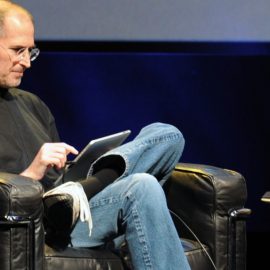

This article is an excerpt from the Shortform summary of "The Smartest Guys in the Room" by Bethany McLean and Peter Elkind. Shortform has the world's best summaries of books you should be reading.
Like this article? Sign up for a free trial here .
Who was Rebecca Mark at Enron, and what was her role in the Enron collapse?
Rebecca Mark of Enron was in charge of Enron International. Alongside other Enron executives, Rebecca Mark, Enron exec, often ran troubled projects with overexaggerated profits, and contributed to the financial collapse at Enron.
Rebecca Mark at Enron International
The Enron International arm began in Teesside in the UK, with a natural gas cogeneration plant built in 1991. This plan supplied both electricity and heat to the local area. This was a successful project, prompting energy companies to ravenously seek similar deals in developing economies.
Rebecca Mark headed Enron International. Fueled by a compensation scheme that rewarded closing deals and not actually building the businesses, Rebecca Mark of Enron International globetrotted and closed deals in dozens of countries. She positioned Enron as the “solver of the unsolvable problem.” She was hungry to come up with projects bigger and better than Teesside.
The projects were often troubled. The largest scandal was in Dabhol, India. A province struck a deal very favorable to Enron, guaranteeing a long-term purchase of highly priced energy. The Indian population revolted, seeing it as rapacious globalization. This stymied development for years.
Furthermore, the financing for projects was often unclear. Enron International hoped the funding they would come from non-Enron sources, but sometimes Enron ended up guaranteeing the debt.
Enron International fed Ken Lay’s desire to hobnob with international luminaries like Kissinger and heads of state, making it less likely to be scrutinized.
By 1996, Enron International accounted for 15% of Enron’s earnings.
Enron International is In Trouble
Meanwhile, Rebecca Mark, Enron International’s former leader, was in deep trouble at water services company Azurix.
With typical Enron hubris, Rebecca Mark thought water was easy and the incumbents were ancient. They would come in, make large deals, and figure out the details later. They also anticipated privatization of water supply, and a coming water crisis.
Immediately they ran into competition with two global heavyweights who competed aggressively for contracts to service municipalities.
Azurix was also in money trouble – the Wessex deal had cost a lot, and Enron saddled Azurix with large debt. So Azurix IPO’d in June 1999, raising $800 million at a stock price of $22 – despite people knowing Azurix obviously wasn’t ready to go public.
Now a public company, Rebecca Mark of Enron stressed the appearance of making big deals to buttress their stock value. In the few deals that Azurix won, they vastly overbid, largely out of desperation to signal momentum.
- Azurix won a contract in Buenos Aires, where the operations they inherited were so poor they couldn’t bill 40% of their customers and the facilities were lacking basic maintenance. It became clear Azurix would never make money on that deal.
4 months after IPO, Azurix had fallen to $13 a share; on a pessimistic earnings call in November, it fell to $8.
By the end of 2000, Azurix had less than $100MM in operating profit, down from $232MM at its start. Its debt load had quadrupled to $2 billion. Enron announced it would acquire the public shares at $8.375 a share.
Jeff Skilling, Rebecca Mark’s Enron rival, took every opportunity to ridicule Azurix as a failed business model, in comparison to his asset-light “logistics” and trading businesses.
Enron believed that Azurix was so unimportant that if it failed, it wouldn’t have any effect on Enron. This later proved wrong. For instance, Enron had $1 billion of debt they were not clearly on the hook for.
(To Mark’s credit, Azurix at least represented real assets and cashflow – low, but cashflow nonetheless).
Rebecca Mark at Enron International contributed to Enron’s collapse. The culture of Enron was to emphasize the appearance of success, while covering up losses. Rebecca Mark at Enron International was no different.

———End of Preview———
Like what you just read? Read the rest of the world's best summary of Bethany McLean and Peter Elkind's "The Smartest Guys in the Room" at Shortform .
Here's what you'll find in our full The Smartest Guys in the Room summary :
- How Enron rose to become one of the world's most promising companies
- How Enron management's greed led it to start cutting corners
- The critical failures that crashed Enron's house of cards to the ground






